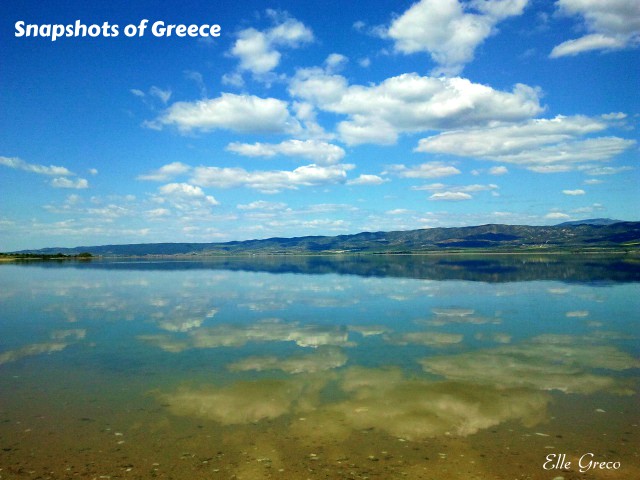Mirror image
Greece has approximately 50 lakes that are larger than 2 hectares, a number that doesn't include artificial lakes or reservoirs. Most of these are found in the north of Greece, though Central and Southern Greece also have sizeable lakes to boast of.
The particular lake in the picture I took is Volvi, situated about 40 kilometers from Thessaloniki. Depending on your starting point and destination, it's a half-hour, uneventful drive across flatland.
It's Greece's second largest lake, spanning 19 kilometers in length and almost 10-13 kilometers in width. It dates back to ancient times, with references to it evident in the works of renowned historians Thucydides and Procopius, while the lake's fish were said to have been to the poet Archestratus's liking.
Its formation was due to tectonic activity in the area, and the fault line that passes just south of the lake still causes minor daily quakes, indiscernible to the region's inhabitants. Nevertheless, the destructive 1978 earthquake of Thessaloniki that killed 49 and left many injured or homeless had its epicenter just south of Volvi, and people who still remember that terrible evening know the potential dangers the entire area can give rise to.
On a more lighthearted note, according to Greek mythology, the fair nymph Bolbe resided there, hence the lake's name (if you were wondering, the Greek letter Β is pronounced V). She was the protector of the lake and one story has it that Hercules begot his son Olynthus from her.
However, the importance of the lake today has nothing to do with Hercules's gallivanting but its association to the fauna whose natural habitat it is. There are 24 types of fish that call it their home and one in particular, a fish called liparia, is endemic and found nowhere else in the world. In contrast to its cousins who migrate to the sea that lies not far from Lake Volvi, it stays put. In addition, 245 bird species dwell in the area and the lake serves as a breeding ground for them as well as for other migratory birds.
Finally, Lake Volvi is one of eleven protected wetlands in Greece under the 1971 Ramsar Convention and the European Natura 2000 ecological initiative.
What amazed me the most in this picture when I took it was the clear reflection of clouds on the serene waters of the lake. It's as if there were no separation between earth and sky as both blended into each other effortlessly.




Comments
Post a Comment